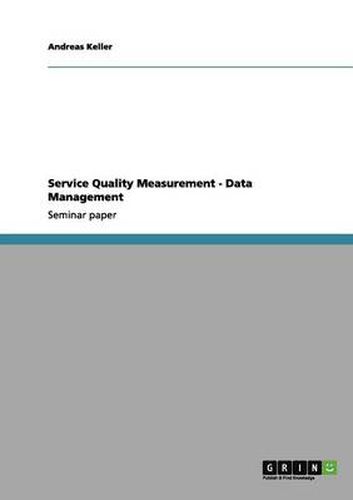Readings Newsletter
Become a Readings Member to make your shopping experience even easier.
Sign in or sign up for free!
You’re not far away from qualifying for FREE standard shipping within Australia
You’ve qualified for FREE standard shipping within Australia
The cart is loading…






Seminar paper from the year 2003 in the subject Business economics - Operations Research, grade: 1.8, University of Strathclyde, language: English, abstract: Over the past decade Service Quality Measurement (SQM) has been receiving more attention worldwide and taking a more central role as a measurement of success. The notion of Service Quality is found well documented throughout the literature and describes the interactive process between the customer and the service provider. In general, the SQM is a powerful technique to monitor customer satisfaction, helping to focus on key areas of improvement in order to establish a new baseline to the current service quality rating. The importance for service organisations is twofold: firstly, in the implications entailed in how to choose the most appropriate technique of service quality measurement, and secondly, in how service organisations can influence the perceptions of an individual customer/user in relation to the service encounter he/she is participating in. Empirically, this involves moving away from a standardised model of the same service for everybody to an approach where the best way of achieving excellent performance lies in addressing the subjective needs of an individual customer, providing precisely the specific service that reflects customers/ individuals’ perceptions. In other words, service is not so much what the business does, per se, but what the customer experiences (Martin 1999i).
$9.00 standard shipping within Australia
FREE standard shipping within Australia for orders over $100.00
Express & International shipping calculated at checkout
Seminar paper from the year 2003 in the subject Business economics - Operations Research, grade: 1.8, University of Strathclyde, language: English, abstract: Over the past decade Service Quality Measurement (SQM) has been receiving more attention worldwide and taking a more central role as a measurement of success. The notion of Service Quality is found well documented throughout the literature and describes the interactive process between the customer and the service provider. In general, the SQM is a powerful technique to monitor customer satisfaction, helping to focus on key areas of improvement in order to establish a new baseline to the current service quality rating. The importance for service organisations is twofold: firstly, in the implications entailed in how to choose the most appropriate technique of service quality measurement, and secondly, in how service organisations can influence the perceptions of an individual customer/user in relation to the service encounter he/she is participating in. Empirically, this involves moving away from a standardised model of the same service for everybody to an approach where the best way of achieving excellent performance lies in addressing the subjective needs of an individual customer, providing precisely the specific service that reflects customers/ individuals’ perceptions. In other words, service is not so much what the business does, per se, but what the customer experiences (Martin 1999i).